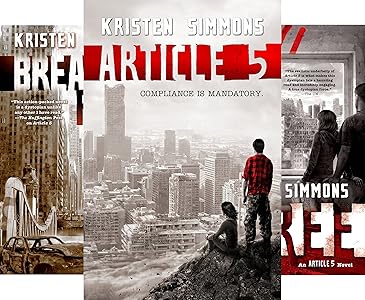So, I put this as my status on Facebook:
Guess which book I’m talking about. I’m reading this YA post-apocalyptic novel where the United States of America has been torn apart by War and now it’s all separated into regions and you can’t move between regions without permission from the central government that is set on enforcing its rules on everybody and then the girl that’s the main character gets abducted from her home by the government and sent to this brutal place with a bunch of other kids but she survives because of this guy that she’s known forever and he loves her and protects her and then they join the rebellion.
My friends have come up with six different novels that match this description, and none of them are correct. That’s the problem with Article 5. It’s been done. Multiple times. And better than this as well.
Article 5 is a standard YA dyslit with the struggling heroine, overly simplified love story that kind of makes me want to retch, because seriously, you’re 17 and hormonal and that’s not true love (n.b. I am a grouchy 37 year old now, apparently, so get off my lawn!) and I was so bored with this book that I ended up skimming the last 100 pages because I’d read enough that I felt like I should finish it so I could give it a full review, because it’s not bad, it’s just dreadfully derivative, but I didn’t want to finish it so it was just sitting on my bedside table on top of a lovely pile of books that I did want to read, staring at me balefully with its bookmark sticking out like an impudent teenager just daring me to try and push it aside and start something else. 
So I finished it. And it was still boring. And predictable. The end.
Also, I got mad at this book because I loved the description of the changes to the political system from the blurb (see below), and I wondered what caused the remainder of the people in the USA (I’m assuming this was a civil war, though it’s never spelled out in detail) to adopt such a harsh system of government, but it’s just accepted that “the War” happened and the author never explains why or how or who or anything. Some backstory would have made Article 5 more interesting to me.




This always seems to happen when a genre gets oversaturated.
I loved your Facebook post and while I was reading it, I thought of yet another book that almost fit, *The Reapers Are the Angels.* I agree with Kelly, this is a publishing problem. They can’t all be “The next Hunger Games,” and they shouldn’t be.
Whu? The Reapers are the Angels isn’t even remotely like the Hunger Games, nor is it trying to be. Except for it being post-apocalyptic (caused by zombies though, not war) and having a female teenage protagonist it has nothing in common … It’s not even YA, despite the age of main character.
Actually I’d recommend it as the perfect antidote book for everyone tired of formulaic post-apoc YA.
I love this review. Sometimes a little originality has to happen!
Yep. Publishers are out to make money and when readers (especially teens) love something like THG, they want to capitalize on the trend. Can’t blame them, but personally, I despise it. I think those of us who read and write SFF review blogs notice it happening pretty quickly (and downgrade our ratings for non-original material) but readers who don’t care about originality just gobble it up and the publishers rake in the money.
But, hey, at least those kids are reading.
I actually had this reaction when I saw this in the catalog which is why I didn’t order an ARC. Sorry I was right, Ruth. Though sometimes when you read these, you wonder what you might have thought had you read it two or three years earlier
Yeah…sometimes I’m pretty tolerant of the first few derivative books. I’m wanting that feel of the first one, but maybe the original author hasn’t put out a new one yet or maybe the series is over and I want to be back in a universe as close to the original as possible. And I think maybe that’s why non-reviewers don’t mind as much. We read books in such volume that we get sick of the unoriginality. Maybe we’ve read the trope 10 times when your average reader has only read it twice.